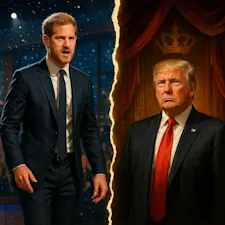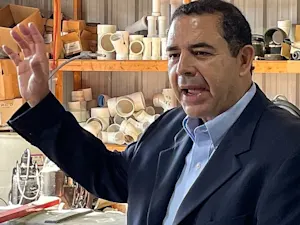
Sean Dunn Sandwich Throw Sparks Total Outrage
A federal grand jury in Washington, D.C., recently delivered a surprising verdict that has captured national attention and sparked debate about the limits of federal law enforcement under President Donald Trump's aggressive policing surge. Sean Charles Dunn, a former Justice Department international affairs specialist, was reportedly charged with felony assault after he allegedly threw a sandwich at a Customs and Border Protection (CBP) agent during a tense encounter in the nation's capital. Yet, despite the viral video and the high-profile nature of the case, the grand jury declined to indict Dunn, underscoring the judiciary's role as a check on prosecutorial overreach amid politically charged enforcement actions.
The Sandwich Incident That Shook Washington
The incident unfolded late one evening on Aug. 10, 2025, when Dunn approached a group of CBP agents patrolling near 14th Street NW. According to court documents, Dunn pointed a finger in an agent's face and shouted insults, demanding to know why the officers were in the city. Then, in a moment that quickly became a symbol of protest and absurdity, Dunn hurled a wrapped sub-style sandwich at one of the agents, striking him in the chest, as reported by the United States Attorney's Office. The entire episode was captured on video by a bystander and quickly went viral, drawing widespread attention to the escalating tensions in Washington, D.C.
Dunn's actions came just one day before President Trump's Aug. 11 order to flood the city with federal agents and National Guard troops in an effort to crack down on crime and restore order. The administration's law enforcement surge has reportedly led to over 1,000 arrests, many of which have sparked controversy over the appropriateness and scope of federal intervention in local policing matters.
Fired and Charged, But Not Indicted
Following the sandwich-throwing incident, Dunn was swiftly arrested and charged with felony assault. The Justice Department moved quickly to fire him, with Attorney General Pam Bondi publicly condemning his behavior and emphasizing that disrespect toward law enforcement would not be tolerated within the administration. Bondi described the case as an example of rooting out problematic elements within the Department of Justice, signaling a zero-tolerance stance on such acts, as reported by the United States Attorney's Office.
Despite the high-profile nature of the case and the administration's tough rhetoric, the grand jury's refusal to indict Dunn reveals a more complex reality. Grand juries operate in secret, weighing evidence presented by prosecutors to determine whether there is sufficient cause to bring formal charges. In this instance, the grand jury's decision not to indict suggests that the evidence did not meet the threshold for felony prosecution, a rare outcome that challenges the common notion that prosecutors can easily secure indictments.
A Symbolic Act of Resistance
While the act of throwing a sandwich might seem trivial or even comical, it has taken on symbolic weight in the context of Washington's federal policing surge. Dunn's protest, captured in a moment of surreal defiance, highlights the tensions between federal authorities and segments of the public who view the crackdown as heavy-handed or politically motivated. His shouted demands and the sandwich itself became a form of absurdist resistance against what some perceive as an occupying force in the city.
This interpretation reflects an analysis of the event's broader meaning rather than a direct statement from Dunn or others involved. The sandwich thrower's gesture, while not violent in the traditional sense, challenged the presence and authority of federal agents in a way that resonated with critics of the administration's approach to law enforcement.
The Judiciary as a Check on Prosecutorial Power
The grand jury's refusal to indict Dunn also underscores the judiciary's vital role as a safeguard against potential abuses of prosecutorial power. In a climate where federal law enforcement is under intense scrutiny and political pressure, the courts serve as a necessary check to ensure that charges are grounded in sufficient evidence and legal merit.
This case is not isolated. Other recent incidents in Washington have reportedly seen prosecutors struggle to secure indictments against individuals accused of assaulting federal agents, with some cases being dropped or reduced to misdemeanors after grand juries declined to act. These outcomes suggest a judicial reluctance to endorse aggressive federal prosecutions that may overstep traditional boundaries or inflame political tensions.
The Broader Context of Federal Policing in Washington
The sandwich incident and its legal aftermath unfold against a backdrop of heightened federal presence in Washington, D.C., following President Trump's declaration of a crime emergency in the city. The administration's strategy involves deploying thousands of federal officers and National Guard troops to supplement local police efforts, a move that has drawn both praise and criticism.
Supporters argue that the surge is necessary to combat rising crime and restore public safety. Critics contend that it represents an overreach of federal authority, undermining local governance and civil liberties. The legal challenges and grand jury decisions in cases like Dunn's reflect this ongoing debate, illustrating the friction between enforcement zeal and judicial restraint.
What Happens Next?
Although the grand jury declined to indict Dunn on felony charges, the case remains a flashpoint in the broader conversation about law enforcement and political protest in the capital. Prosecutors retain the option to revisit the case or pursue lesser charges, but the grand jury's decision sends a clear message about the limits of prosecutorial reach in politically sensitive cases.
For Dunn, the episode has already cost him his job and placed him at the center of a national spectacle. For the justice system, it serves as a reminder that even amid political pressure and public spectacle, the wheels of justice can turn with measured deliberation and independence.
A Surreal Moment in a Serious Debate
The image of a man throwing a sandwich at a federal agent might seem like a bizarre footnote in the saga of Washington's federal policing surge. Yet, it encapsulates the surreal and often contradictory nature of political conflict in 2025. It is a moment where absurdity meets authority, where a sandwich becomes a symbol, and where the judiciary stands as a check on excess.
As you follow this story, consider the layers beneath the spectacle. The grand jury's decision is not just about a sandwich. It is about the balance of power, the limits of protest, and the enduring role of the courts in protecting the rule of law — even when the law enforcement surge feels overwhelming.
In the end, the sandwich thrower's saga is a reminder that in America, even the smallest acts can challenge the mightiest forces, and that the justice system, with all its imperfections, still holds the power to temper political excess.
References: Prosecutors fail to indict sandwich thrower in Trump's Washington public safety operation | District of Columbia | Former DOJ Employee Who Hurled a Hoagie at a U.S. Customs and Border Patrol Officer Charged With Assault | United States Department of Justice | DOJ employee throws sandwich at federal agent: Pam Bondi fires alleged Washington, DC Subway sandwich thrower Sean Charles Dunn






















